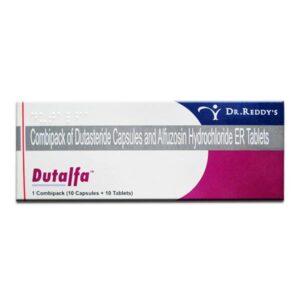ALFUZOSIN + DUTASTERIDE
Alfuzosin: Alfuzosin is a medication that belongs to a class of drugs known as alpha-1 blockers or alpha blockers. It is primarily used to treat the symptoms of an enlarged prostate, a condition medically known as benign prostatic hyperplasia (BPH). Symptoms of BPH can include difficulty urinating, frequent urination, weak urine flow, and the feeling of incomplete bladder emptying.
The mechanism of action of alfuzosin involves blocking the alpha-1 receptors found in the smooth muscles of the prostate gland, bladder neck, and the urethra. By doing so, it relaxes these muscles, leading to improved urine flow and reduced BPH symptoms. However, it does not shrink the size of the prostate gland.
The usual recommended dose of alfuzosin for adults is 10 mg taken orally once daily. The medication should be consumed after the same meal every day to enhance absorption and reduce the chance of side effects.
Common side effects of alfuzosin include dizziness, lightheadedness, fatigue, headache, nasal congestion, and stomach discomfort. These adverse effects are usually mild and temporary. It is important to avoid activities that require mental alertness, such as driving or operating machinery, until the individual knows how the medication affects them.
In rare cases, alfuzosin may cause more serious side effects such as priapism (prolonged and painful erection), fainting, allergic reactions, and liver dysfunction. If any of these occur, it is essential to seek immediate medical attention.
It is important to note that alfuzosin may interact with other medications, including certain antifungal medications, antibiotics, antiviral drugs, and medications used to treat high blood pressure or erectile dysfunction. Therefore, it is crucial to inform the healthcare provider about all current medications and medical conditions before starting alfuzosin.
Dutasteride: Dutasteride is a medication that is primarily used to treat symptoms of benign prostatic hyperplasia (BPH) in men. BPH is a non-cancerous enlargement of the prostate gland, which can lead to difficulties in urination such as frequent urination, weak urine flow, and difficulty starting and stopping urination.
The mechanism of action of dutasteride involves inhibiting the enzyme 5-alpha-reductase. This enzyme is responsible for converting testosterone to dihydrotestosterone (DHT), a hormone that plays a key role in the development and enlargement of the prostate gland. By inhibiting 5-alpha-reductase, dutasteride effectively reduces DHT levels, which helps to shrink the prostate gland and relieve symptoms of BPH.
Dutasteride is typically taken in oral capsule form, with or without food. The recommended dose for BPH is 0.5 mg once daily. It may take several months of consistent use to see the full benefits of the medication.
While dutasteride is generally well-tolerated, it can cause some side effects. Some common side effects include decreased libido (sex drive), erectile dysfunction, ejaculation disorders, breast tenderness or enlargement, and dizziness. These side effects are generally mild and resolve on their own after discontinuation of the drug. However, it is important to note that dutasteride can also increase the risk of high-grade prostate cancer, and thus it should be used with caution and under the guidance of a healthcare professional.
It is important to consult with a doctor or healthcare provider before starting dutasteride, as they can provide personalized advice based on individual circumstances and medical history.

